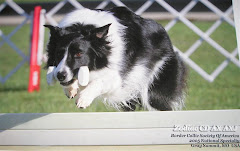This is a nasty, but fortunately, relatively uncommon disease. One of the reasons distemper is uncommon (other than routine vaccination) is that the virus does not survive long outside the body (unlike parvo). Distemper virus is easily inactivated by routine disinfection and even with inadequate cleaning, only lives 30 minutes to a few hours. Distemper is most common in puppies but adult dogs who have never had any vaccines are certainly susceptible, although they are unlikely to come into contact with the virus unless they enter a contaminated shelter, etc.
Transmission of distemper is typically airborne or via nasal droplets, hence requiring direct dog to dog contact, or contact with very fresh respiratory secretions. Within 3-6 days after infection the puppy will develop a fever which may come and go unnoticed. Days later, as the virus attacks the respiratory tract other signs will appear including nasal and ocular discharge, cough, and pneumonia. The virus then moves on to the GI tract causing vomiting and diarrhea.
The virus can then move on and hide out in the skin and central nervous system for varying amounts of time. This can cause hyperkeratosis (hardening) of the foot pads. But worse, it can cause neurologic signs, even weeks after appearing to have recovered from the initial symptoms. Neurologic signs include, but are not limited to, seizures, tremors, convulsions, "chewing gum" fits, weakness and imbalance. These can be progressive to the point of death or warranting euthanasia or they may be non-progressive but permanent. Sometimes recovery is possible even at this stage.
The extent and severity of disease is determined by the puppy's immune response. A strong immune response will clear the virus before severe signs develop and the puppy will be fully recovered within 2 weeks. A weak or failed immune response allows the virus to reach the epithelial cells which line many organs and tissues including the nervous system. This phenomenon accounts for the wide variety of clinical presentations with some pups only having a few mild respiratory signs and some progressing to seizure and death within weeks.
To compound the complexity of this devastating disease, there is no good way to make a definitive diagnosis. Unlike Parvo, there is no quick and easy in-house test to perform. Even the tests that can be sent out to laboratories can be inconclusive because vaccination will often interfere providing a false positive. Because many of these puppies come from shelters or pet stores they were often vaccinated at least once-just not in time to prevent infection, instead it interferes with diagnosis!
Treatment, as with most viral diseases is aimed at controlling the clinical signs and secondary infections. Prevention, luckily, is pretty simple. Routine vaccination every 2-4 weeks from eight week of age until 16 weeks of age is the general protocol. Vaccine failures are likely for similar reasons as parvo-damaged vaccine, non-responding animal etc.
Unlike parvo, distemper can leave some tong term effects on dogs. As mentioned, some will have permanent neurologic defects that may affect their quality of life, or require long term medical management. Also, because the virus attacks epithelial cells the developing teeth of a puppy can be affected leaving them with enamel lesions when their permanent teeth erupt. Finally, some recovered dogs harbor the virus in their central nervous system for years, only to break with "old dog encephalitis" years later. It is not well understood why these dogs suddenly present with neurologic signs so many years after recovery.
Distemper is shed in body secretions for 2-3 months post recovery and suspected cases should be isolated from other susceptible animals during this time.
Following puppyhood vaccines, a booster is usually given one year later and then every 1-3 years depending on the hospital protocol. Every three years is generally considered adequate. The same issues with with titers exist as with parvo. Some immunology specialists feel that it is not worthwhile to repeat vaccines in a well-vaccinated dog even if it has a low titer. The logic behind this is that they are likely a non-responder and more vaccines will not change this.
The Big Number 3
1 week ago


.jpg)
.jpg)



.jpg)



9 comments:
Not much to add other than that I really enjoy when you do these series! :o)
I will say that, while both of my dogs have had the puppy series of shots and the one year boosters, I have chosen not to continue with routine vaccines for anything other than rabies (which is required by law). With the high percentage of dogs that titer positive years later, I believe that this initial vaccination series is as effective as is needed, and that farther vaccines will only serve to weaken the immune system and increase the possibility of vaccine reaction, including and up to vaccine related cancer. (Unlike many anti-vaccine people, however, I do believe that all dogs should receive vaccines for serious contagious diseases such as distemper at least once.)
Four years ago I fostered a 1 year old hound mix that I eventuallly adopted who arrived at my house from a shelter with discharge from his nose & a cough. The rescue sent him away to be neutered & he was vaccinated at that time. A couple of days later I noticed his eye was red & received the ok to take him to my vet. His cornea was badly scratched. We began treating him with several types of drops. A few days later he developed diarrhea & began vomiting. Back to my vet who began treating him for what she suspected might be pneumonia - he was very ill for a few days and then gradually started to come around. He came home & the first night he had a seizure. At that time I had an epileptic dog so i knew what to watch for - he went back to sleep afterwards & I got him back up to the vet the next morning. They did the blood work to check for distemper, added an anti-inflammatory drop for his eye & put him on pheno for the seizure as a precaution. Then we waited for the results. It took several days & it was inconclusive as you said in your post - we never really knew if he had distemper. We slowly weaned him off the phenobarbital with no more seizure activity & he recovered completely. The shelter he came from said they had never had a case of distemper & the other dogs that were on the transport were all ok. He has had some other issues over the years including HGE two years ago & was recently diagnosed with IVDD. Poor little guy - he can't catch a break.
While immunity to parvo, distemper and some other diseases is likely quite long, possibly for life we don't actually have "official" proof of this. So while that is a reasonable choice to make I doubt many vets will put their licence on the line and actually officially recommend it. On the flip side, some vaccines we know don't have a long duration of immunity (lepto, lyme, for example). So an all or nothing protocol may not be appropriate depending on location and disease risk.
I had an old dog, 13, die of Distemper. Though she had been vaccinated as a young dog, she didn't have any vaccinations after the age of six. It was an awful time and now my dogs are on a three year schedule except for Lepto and Lyme.
Sue-that's a good example of questions raised by newer vaccine protocols. Was she just a non-responder or did her immunity simply run out? Things we may never fully know or understand.
My vet doesn't recommend the vaccine protocol- likely for the reason you stated. However, my vet has never once offered the vaccines again after I told her and her staff that I did not plan on repeating any vaccines except for rabies. Since most vets will occasionally ask about vaccines, even when a client states no interest in them previously, I am taking it as an implicit approval.
If our local wildlife populations were to have a high incidence of distemper I would get a distemper-only booster shot for my dogs.
I would guess those are correct assumptions.
Our dog at the aged of 7 was diagnosed distemper last Feb 12 , 2017 , the moment he was diagnised the vet recommend to give him a conglab D shot for 5consecutive days. After that another 5 shots every other day, undortunately during these 10days treatment, our dog developed seizure and start having inbalanced and his forelimbs are getting weeks. As to date our dog and us are still fighting, today is the 21st day after he was diagnosed with distemper.
Post a Comment